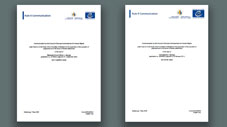
Council of Europe Urges Georgia to Address Police Abuse and Legislative Reforms
By Liza Mchedlidze
Wednesday, May 28, 2025
Michael O'Flaherty, the Council of Europe's Commissioner for Human Rights, has called on Georgian authorities to effectively investigate police abuse, reduce the Special Investigation Service's (SIS) dependency on the Prosecutor's Office, and revise recent legislative changes. In two communications to the Committee of Ministers, he addressed the cases of Tsintsabadze v. Georgia and Makarashvili and Others v. Georgia, concluding that Georgia faces persistent issues with arbitrary administrative detention and insufficient judicial review in such cases.
The Tsintsabadze group of cases involves deaths, torture, and other ill-treatment, often attributed to law enforcement and prison officials, with ineffective investigations. In 2024, the Committee of Ministers expressed concerns over Georgia's delays in executing European Court of Human Rights judgments related to these cases.
O'Flaherty emphasized the need for law enforcement actions, especially during public assemblies, to adhere to principles of legality, necessity, and proportionality. Drawing from his January 2025 visit to Georgia, he cited violent crackdowns on pro-EU rallies as evidence of the need for reforms.
He recommended mandatory visible identification for all police officers to enhance accountability, independent investigations into police abuse, and strengthening the SIS by reducing its dependency on the Prosecutor's Office, empowering it to suspend abusive officers, and enhancing victim participation in investigations. He also called for reviewing criminal law provisions to better protect against ill-treatment and provide comprehensive reparation for survivors.
These recommendations come as the Georgian Dream-led Parliament has passed, in its first reading, a bill to dissolve the SIS and transfer its responsibilities to the Prosecutor's Office.
In the Makarashvili and Others v. Georgia case, O'Flaherty highlighted ongoing problems with arbitrary administrative detention and inadequate judicial review. The case centers on alleged violations of freedom of assembly and fair trial rights during a 2019 demonstration.
He urged the Georgian government to reform the Code of Administrative Offences through meaningful consultations with civil society, the Public Defender's Office, and international bodies; revise legislative amendments since November 2024 that restrict peaceful assembly rights; and ensure timely, independent judicial review, access to legal counsel, and the right to present evidence and witnesses, in line with Article 6 of the European Convention on Human Rights.

